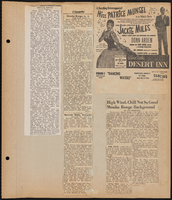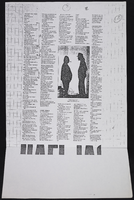Search the Special Collections and Archives Portal
Search Results
Rich Rizzo Professional Papers
Identifier
Abstract
The Rich Rizzo Professional Papers (approximately 1960-2022) are comprised largely of photographs documenting the life of Las Vegas, Nevada dancer and choreographer Rich Rizzo in shows such as Jubilee! and Lido de Paris in Las Vegas and in Paris, France. The photographs show rehearsal and performances, Rizzo with his partner and fellow choreographer Winston Helmsley, dancers and showgirls, Donn Arden, and Miss Bluebell. Other types of material include business and personal correspondence, contracts, production prospectives and set designs, show programs, and costume design photographs.
Archival Collection
Tonopah and Tidewater Railroad Records
Identifier
Abstract
The Tonopah and Tidewater Railroad Records (1905-1977) contain correspondence, purchase requisitions, bills of lading, freight reports, and waybills. Also included are a ledger book, a rubber stamp, and a booklet, "Diagrams of Locomotives and Tenders." Incorporated in 1904, the Tonopah and Tidewater Railroad operated for 35 years, connecting Ludlow, California with Beatty, Nevada by way of Death Valley on the Santa Fe Railroad main line. The records are concentrated on the later years of the railroad from 1930 to 1940.
Archival Collection
Frank Williams Papers on Early Nevada
Identifier
Abstract
The Frank Williams Papers on Early Nevada (1892-1946) consists of manuscripts written for the most part by Frank Williams, an early resident of Southern Nevada. The collection includes Williams' autobiography as well as histories of Goodsprings, Potosi Mine, Mesquite Valley, and the Yellow Pine Mining districts. Finally, this collection contains reports and material reflecting Frank Williams' two terms as University Regent (1909-1912 and 1923-1942) at the University of Nevada, Reno, and his four terms in the Nevada State Assembly.
Archival Collection
Danny Cassella Collection of Sheet Music
Identifier
Abstract
The Danny Cassella Collection of Sheet Music (1940s-1960s) consists of stock arrangements for songs and scores from the 1940s through the 1960s. The arrangements were collected by musician Danny Cassella. Additionally the collection contains several Tune-Dex cards.
Archival Collection
Marge Jacques Papers
Identifier
Abstract
The Marge Jacques Papers (1960-1990) comprise the personal papers of Marge Jacques, a prominent member of the Las Vegas, Nevada gay and lesbian community, and owner of the gay bar, Le Cafe. The papers contain correspondence, licensing records, financial statements, and artifacts from clubs that Jacques owned or managed. Also included are photographs, videotapes, audiotapes, newspaper clippings, and Gipsy Nightclub promotional material.
Archival Collection
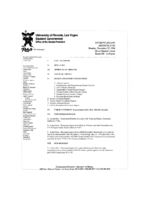
Meeting minutes for Consolidated Student Senate University of Nevada, Las Vegas, November 25, 1996
Date
Archival Collection
Description
Text
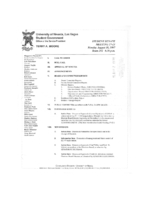
Meeting minutes for Consolidated Student Senate University of Nevada, Las Vegas, August 18, 1997
Date
Archival Collection
Description
Text
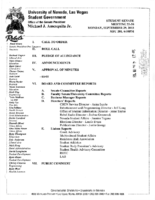
Meeting minutes for Consolidated Student Senate, University of Nevada, Las Vegas, September 29, 2003
Date
Archival Collection
Description
Text

